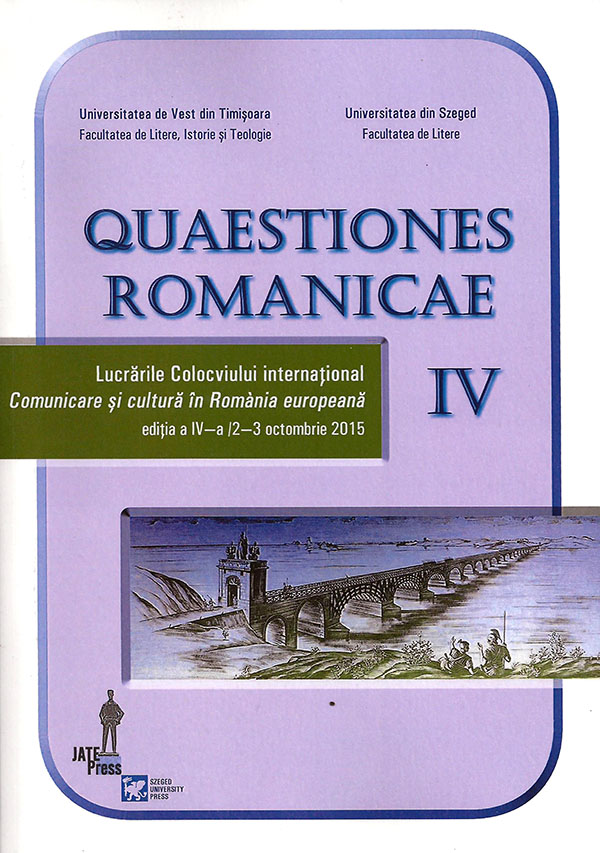Aspecte din istoricul activităţii Uniunii Patrioţilor în Banat în anul 1944
Abstract: (Aspects of the historical of the activity of the Patriots Union in the Banat county in the year 1944): After the events from 23 August 1944, the Patriots Union and its press agency, as sattelites of the P.C.d.R, came aut of illegality and were installed in Romania and in its Western region. It was here that a new press agency, entitled demagogically Lupta patriotică (Patriotic Fight), and Romania Liberă (Liberated Romania) were moved to Bucureşti from the U.R.S.S. Its members, demagogically affirmed that the U.P sign could be translated with U for Unity and P for (Country-Patriae). It involved the so called patriots, no matter the party they were members in along with those politically not involved, especially the intellectuals and the middle class, from public or private servants to clergy, industrials and patron kraftsmen. It owed its adressability to the fact that the P.C.d.R was aware that this segment of the population was partially politically unenrolled. It was asserted that they represented the third force, after the first represented by the workers, sustained by P.C.d.R and P.C.R, and the peasants as the second class with the Ploughmen Front as another sattelite political formation of the communists. There were three categories of persons involved: the first- those who tried to continue their carrieer initiated in between the two World Wars, withouth joining the Communist Party, but to one of its political organization, the second one- those who in this period began their political and professional ascension, and last but not least, those who tried to hide their compromised past of dictatorship regime joinings. By not being accepted to participate in the two Sănătescu governments and that of general Rădescu, the Patriots Union was included in the pro communist govern led by Petru Groza, so called of wide democratic concentration, installed under Soviet pressure, receiving- in the actuall govern- four ministries and a state subsecretary position. To highlight the position of the Patriots Union in Banat, they obtained the position of prefect of the Timiş- Torontal county, residing in Timişoara. Some of the intellectuals did not attend this intermediary form and joined P.C.d.R directly or the Romanian Association for Soviet Links (A.R.L.U.S), formed after 23 August 1944 with sections throughout the country, including the counties from the Western part of Romania. After the legal establishment of the Patriots Union, organizations on national level appeared, including in the counties that formed the Local Department of Banat, up to the level of small rural districts and communes.
Keywords: Patriots Union , Banat, 1944, pro-communist, activity.
Rezumat: După lovitura de stat de la 23 august 1944, Uniunea Patrioţilor şi organele sale de presă, ca satelite ale P.C.d.R.-ului, au ieşit din ilegalitate şi s-au instalat pe teritoriul României, inclusiv în zona de sud-vest. Aici a apărut şi un organ de presă al acesteia, intitulat demagogic Lupta patriotică, iar România liberă a fost transplantată de pe teritoriul U.R.S.S. la Bucureşti. Tot în sens demagogic, se afirma – de către membrii acesteia – că sigla U.P. putea fi tradusă şi prin termenii de Unire şi Patrie. Ea avea la început, ca adresabilitate, pe toţi cei care voiau să fie aşa-zişi patrioţi, indiferent de partidul din care făceau parte şi pe cei neînregimentaţi în niciun partid politic, şi mai ales pe intelectuali şi pe aşa-zisele pături mijlocii, adică: funcţionari publici şi particulari, liber-profesionişti, clerici, industriaşi şi pe meseriaşii-patroni. Aceasta, pentru că P.C.d.R.-ul conştientizase faptul că acest segment al populaţiei României rămăsese parţial neînregimentat politic. Se afirma că aceştia reprezentau a treia forţă, prima fiind muncitorimea, reprezentată de P.C.d.R., apoi P.C.R., iar a doua fiind ţărănimea, care era reprezentată de către Frontul Plugarilor, o altă formaţiune politică satelită a comuniştilor. Ea cuprindea trei categorii de persoane: prima – cei care au încercat să-şi continue cariera începută în perioada interbelică, fără a adera direct la Partidul Comunist, ci la o organizaţie politică a acestuia, a doua – pe acei care, în această perioadă, şi-au început ascensiunea politică şi profesională şi, nu în ultimul rând, pe cei care au încercat să-şi ascundă trecutul compromis de aderenţa la diverse regimuri dictatoriale anterioare. În sud-vestul României, tocmai pentru a i se da importanţă, Uniunea a primit postul de prefect al judeţului Timiş-Torontal, cu reşedinţa în municipiul Timişoara. Dar unii dintre intelectuali nu au recurs la această formă intermediară şi s-au înscris direct în P.C.d.R. sau în Asociaţia Română pentru Legături cu Uniunea Sovietică (A.R.L.U.S.), formată – şi ea – după 23 august 1944 şi care avea filiale în toată ţara, inclusiv în judeţele din sud-vestul României. După ieşirea din ilegalitate, Uniunea Patrioţilor a început să-şi constituie organizaţii la nivel naţional, inclusiv în judeţele care formau aşa-numita Regionala Banat a acesteia, până la nivel de plasă şi comună.
Cuvinte-cheie: Uniunea Patrioţilor, Banat, 1944, pro-comunist, activitate.
